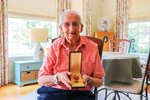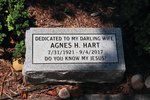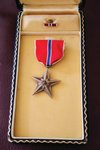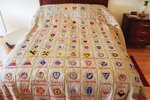






PITTSBORO — At 102 years of age, Chatham County resident Wesley Hart is in rare company — one of just a relative handful of surviving centenarians from among the 16 million U.S. servicemen who fought in World War II.
He’s about to join an even more exclusive club.
On Aug. 12, during a ceremony in Pittsboro, Hart will be awarded the French Legion of Honor for his meritorious service in France during World War II. It’s the highest French decoration of distinction for those in military and civilian life in France, tracing its history to Napoleon Bonaparte, who established it in 1802.
There are only about 92,000 Legion of Honor members, mostly French nationals, but 300 or so foreigners are recognized with the honor each year. You can’t seek Legion of Honor recognition for yourself; French ministers identify potential recipients, who are in turn invited to apply.
Hart will receive the symbol of the award — with its famous red ribbon and five-armed Maltese asterisk hung on an oak and laurel wreath medal — in a ceremony at 10:30 a.m. on Aug. 12 at New Salem Church on Old Graham Road in Pittsboro.
The public is invited to the event. French Consul General Vincent Hommeril, who’s based in Atlanta, will make the presentation.
Among the 10,000 or so American recipients awarded entry into the group over the years are former Army General George S. Patton, former Army General and President Dwight D. Eisenhower, aviator Charles Lindbergh, animator and entrepreneur Walt Disney and a wide array of other historic Americans who have made a mark in France — among them, comedian Jerry Lewis, author James Baldwin, musician Miles Davis, chef Julia Child and still-living Americans Clint Eastwood and Bob Dylan.
Until recently, Hart — who was a member of both the 44th Infantry and 102nd Infantry divisions and was in active service from September 1942 through February 1946 — didn’t even know he was being considered for the Legion of Honor.
Here’s how it happened: a former Chatham County resident now living in South Carolina — Phil Bienvenue, who was a member of a Veterans of Foreign Wars chapter — attended the same church as Hart’s daughter, Kathy Wakeman. Bienvenue told Wakeman he’d heard the French government was looking for potential Legion of Honor applicants.
Hart, who achieved the rank of Captain while in the Army, received the Bronze Star Medal for his service during the Battle of the Bulge in the winter of 1944-45. Knowing about his Bronze Star, given for heroic achievement or meritorious service in a combat zone, Wakeman and her sister, Lynne Dyer, agreed their father might be a good candidate.
Hart lives with Wakeman in Chapel Ridge; Dyer lives next door. Wakeman filled out the lengthy application — which also required extensive documentation — and submitted it in writing to the French consulate in Atlanta. Hart’s late wife Agnes had kept all of Hart’s service records, making the time-consuming application process easier, but the girls still decided not to tell Hart about it in the event he didn’t receive the honor.
Then Wakeman and Dyer waited.
“We didn’t hear anything for two years,” Wakeman said.
The coronavirus pandemic then happened, and the sisters assumed that the recognition, for which there is no set criteria, wasn’t going to happen. Wakeman, in fact, ran across a copy of the application while cleaning the office in her home later and decided — since she’d not heard anything about it — to shred it.
About a month later, the telephone in her home rang. It was Pierre Frechette from the French consulate in Atlanta.
“I was on the floor, because I knew what was coming,” Wakeman said, laughing. “He said, ‘We want to give your father the Legion of Honor.’”
Hart’s service with the U.S. Army began in the winter of 1941. He was drafted out of his native New York and assigned to the 44th Infantry Division for basic training in Fort Dix, N.J. After Pearl Harbor, he was deployed to Ft. Lewis in Washington state, then went to Officer Candidate School in Maryland, where he became an ordnance officer and 2nd Lieutenant.
After a stint in Texas, Hart ended up back near Fort Dix before traveling from the U.S. to Europe in 1944 aboard the Queen Elizabeth, which had been converted from a cruise ship to a troop transport. His last three nights in the United States were spent in New York City with Agnes before he set sail for Glasgow, the large Scottish port town, in war-torn Europe.
After disembarkation, Hart, members of his Company and fellow soldiers took a train to South Hampton, England, a major staging area for June 6, 1944, D-Day invasion on Normandy.
Hart’s landing on Omaha Beach on the French coast occurred after D-Day — which was a turning point in World War II — and “was similar to the landing on D-Day, except that there were no bullets flying,” Hart wrote.
He tells that story in a self-published book recounting his military experience. About 18 months ago, not long after assembling the Legion of Honor application, Wakeman and Dyer began helping Hart put his recollections to paper. The result — “WWII: In My Words” — is a matter-of-fact, first-person narrative of Hart’s wartime experience. Wakeman did much of the transcribing of Hart’s recollections and worked with the printer; Dyer handled the editing.
The 54-page book is brief — The Battle of the Bulge and Germany’s surrender, for example, are each covered in a page or so — but filled with Hart’s insights, observations and personal recollections. In a section about the Battle of the Bulge, for example, Hart writes that his company was stationed near a railroad bridge in Düsseldorf, Germany, that had been destroyed. In the railroad yard “were three flatbed cars loaded with German rocket bombs.”
“Our General wanted to know if the bombs could be fired back at the Germans,” Hart writes. “It became my job as the Division Administration Officer to find a way to do just that. I enlisted the help of two other officers, and we found a building in the brickyard in where there was a bomb shelter. There was also a large bomb crater in the yard. The bombs were 18” in diameter and about four feet long and housed in a crate that had a hinged front end that opened. With wire and detonators, we were able to fire a single rocket bomb from the shelter. It went over the Rhine River just as we had planned.”
The book tells how Hart and his company followed the Allies’ front lines through France and Belgium and into Germany, providing ordnance and ammunition en route to Germany’s ultimate surrrender. Because Wakeman and Dyer are neighbors, access to their father, was, of course, easy. Accessing his memories of his service experience wasn’t too difficult, either. Beginning in his 40s and 50s, Hart — after not talking much about his wartime years when they were children — started sharing war stories with his daughters.
“We helped him,” Wakeman said. “We’d heard some of the stories over and over. He would forget some of the details, but because we’d heard the stories we were able to help him remember.”
Today, with the Legion of Honor ceremony approaching, his daughters say the honor is beginning to sink in for Hart.
“Well, you know, he’s 102,” Wakeman said. “And I think it took several weeks to sink in. He acknowledged it, but it’s only been about the last week or so that he started to ask real questions about it. So it took a little while to absorb it.”
Hart suffers from macular disease, but Wakeman and Dyer say his mind is still sharp enough to comprehend what will happen on Aug. 12.
“He heard me,” Wakeman recalls about telling her father of the Legion of Honor news, “and I didn’t push it because I wanted him to think about it … So he worked it all through and he finally got to figure it out. And he said, ‘This is really getting exciting.’”
For Wakeman, hearing her father’s stories makes her realize how brave, “and how tough,” he and his fellow soldiers were.
“… and how determined they were,” she said. “It was an exceptional generation because I don’t think people realize what they did ... because it’s hard to imagine it today. So I’m just proud of him — and both of them, because although my mom is gone, we were equally proud of her because she stood by him and was such a good wife.”
Wakeman said Agnes would be thrilled to know about Hart’s honor. She died in 2017, about a month before the couple’s 75th anniversary.
“She would be over the moon,” Dyer echoed.
Dyer recalls spending one rainy day years ago with her mom and dad, listening to him tell stories; she was suddenly struck by how much she’d learned from him.
“We found all these pictures and dad started talking and telling all these little stories,” she said. “And you know, it made me realize what made him such a wonderful dad. He gave us the resourcefulness and the ingenuity and the ‘chutzpah,’ if you will, to get through any tough situation.”
Dyer remembers hearing Hart tell her that because he was an officer, he could have bunked in more comfortable barracks where most officers slept — but he’d prefer to stay with “his men.”
That was typical of him.
“Just the things that he did,” Dyer said. “They needed the ‘so-and-so’ to make that Jeep work, so Dad would go into a bombed-out factory and find a part and get it going. And I’m thinking, ‘That was Dad.’ He was the most resourceful person to figure out things, to make it work, or to put it together. He has always been the fix-it man.
“He had that kind of mindset,” she said. “And all the ways we knew him as a dad growing up, I can visualize that in him as a soldier, and as a younger man. So I think that’s kind of what this means to us — it brings it all together, and it’s so appropriate, because this is our dad, and who he is, and who he was at that time and what he meant to everyone around him.”